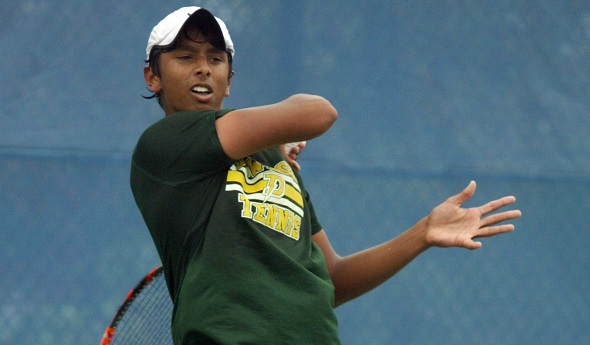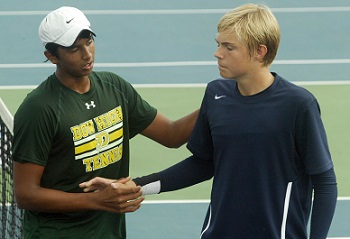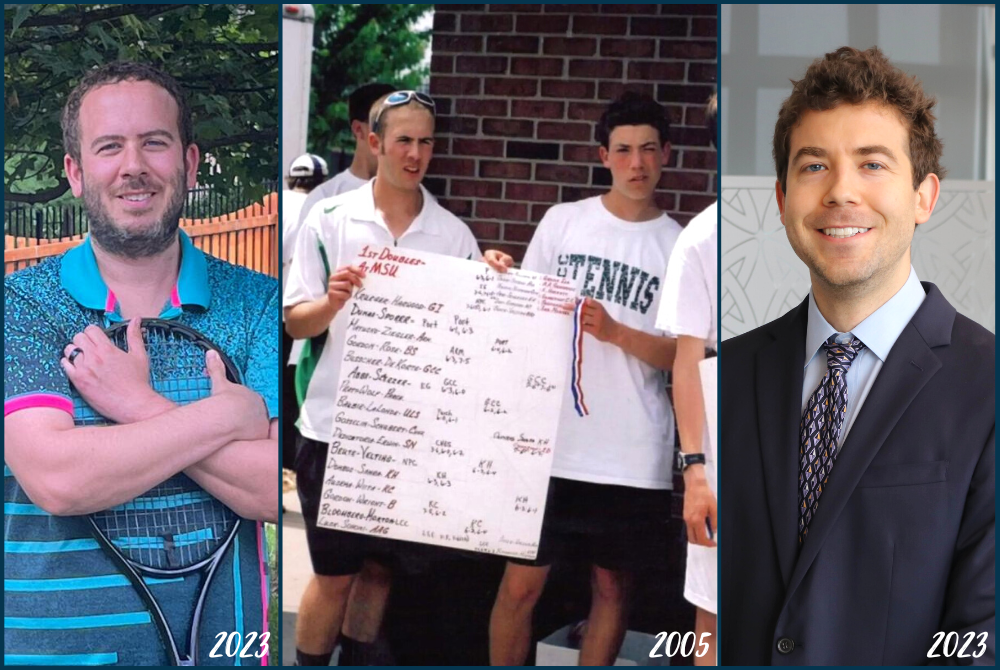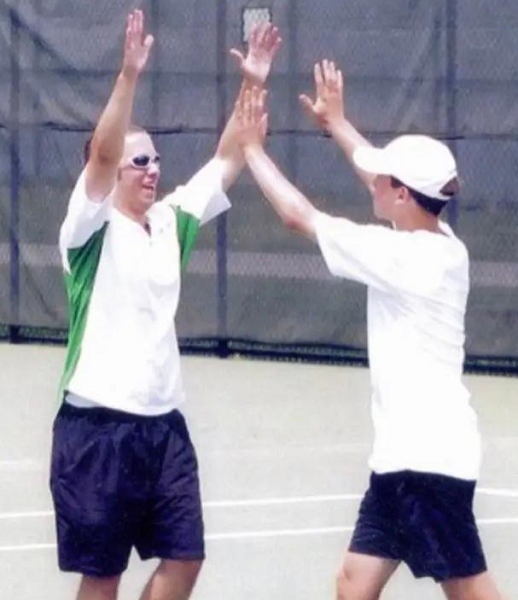
Performance: Dow's Varun Shanker
October 20, 2016
 Varun Shanker
Varun Shanker
Midland Dow senior - Tennis
Shanker finished an incredibly successful and in ways unprecedented career Saturday by winning the No. 1 singles championship at the MHSAA Lower Peninsula Division 2 Final while leading the Chargers to their first team championship since 2013. Shanker became the first No. 1 singles champion for his school's prestigious program since 1999 and finished 32-1 this season in earning the Michigan National Guard “Performance of the Week.”
This was Shanker’s third season at No. 1 singles; he also won No. 3 singles as a freshman as Dow earned a fifth straight Division 2 team title. The next fall, Shanker became the first sophomore captain in Chargers history, and as a sophomore and junior he made the Division 2 semifinals at the top flight. But this fall was special; Shanker’s only loss was to Birmingham Groves’ Gabe Liss, who Shanker came back to beat two weeks later, and total his season sheet included victories over four of the top-six seeded players in Division 2 and three of the top five at the Division 1 Final including eventual champion Steven Forman of Troy. Shanker had 11 wins over players considered among the top 100 in their age groups in the Midwest, including a 7-6 (6), 3-6, 7-6 (8) nail-biter over Kalamazoo Loy Norrix freshman Reed Crocker in Saturday’s championship match. Shanker finished 115-19 over his four varsity seasons.
 Shanker followed into the program his brother Vikram, a 2014 graduate who remains tied for second in MHSAA history with 132 career doubles wins and who was named an MHSAA/Farm Bureau Scholar-Athlete Award winner as a senior. Similarly, Varun has a 4.0 grade-point average (4.79 weighted) and is a National Merit Scholarship semifinalist. He’s been part of teams that have won three first-place A.H. Nickless Innovation Awards and a total of $135,000 in scholarship and grant money for work in water purification by electrodialysis, piezoelectric devices and microbial fuel cells. He’s contemplating studying biomedical engineering as he considers opportunities for academics and tennis at the next level.
Shanker followed into the program his brother Vikram, a 2014 graduate who remains tied for second in MHSAA history with 132 career doubles wins and who was named an MHSAA/Farm Bureau Scholar-Athlete Award winner as a senior. Similarly, Varun has a 4.0 grade-point average (4.79 weighted) and is a National Merit Scholarship semifinalist. He’s been part of teams that have won three first-place A.H. Nickless Innovation Awards and a total of $135,000 in scholarship and grant money for work in water purification by electrodialysis, piezoelectric devices and microbial fuel cells. He’s contemplating studying biomedical engineering as he considers opportunities for academics and tennis at the next level.
Coach Terry Schwartzkopf said: “As Dow’s only three-year captain in history, Varun demonstrated the character, drive, determination, and dedication needed in order to claim a championship. In terms of community, he has organized beautification projects within Midland and participated providing free tennis clinics in the tri-cities. He has handled grant applications for team income, ordered inventory including uniforms and warm-ups, and handled media relations. As for athletics, we have had talented teams who won championships based on the depth of talent. This year, it was based upon work and improvement. Varun spent the offseason corralling kids, encouraging them to train, and even offering rides when needed. During season, he would work daily with players individually, deconstructing and rebuilding pieces of their game. He ... worked more as an assistant coach than a player. Varun unified, inspired, and took players to task when needed. He had no issue calling out players due to lack of effort and praising those who worked hard. In 17 seasons as a coach, Varun is without a doubt the strongest captain I have ever had. There was never a single time in four years where I questioned his loyalty to the program, his drive to succeed, or his willingness to give all he had to help his team succeed. In fact, I have never wanted a player to win a championship more than him because that was never his focus. From the beginning, his focus was team. He was content that if he played his best he would be satisfied with his outcome, provided the team was successful."
Performance Point: “Coming into the tournament as the one seed, there’s always a little pressure,” Shanker said. “For me, this year was different. This year, I knew, was my chance, that I could do something special. That I could fulfill my dream of always winning the one singles position. I knew I’d have tough opponents to play in the tournament, but I definitely came in with a focused mindset, and obviously it’s tough to not reflect on that last match, those last few points. … I was down two match points, and he literally needed one point to win twice. I want to say my back was against the wall; that’s as close as it’s going to be. To me, it was about believing. I saw my teammates cheering for me; I saw my coach. I saw it was (about) way more than one match, but all the support, and I was able to find it in myself to get a little bit tougher and mentally to be able to pull it out. The support was unbelievable.”
Dow dynasty: “It’s been unbelievable. We had a tradition of excellence here when I came in as a freshman; we had won four consecutive state titles. When I finally joined the team freshman year, I was finally able to understand why it’s like that. Coach instills hard work and preparation, and that was the reason we were able to achieve that. As my career progressed, I was able to learn what some of the things are that are able to make us successful, what some of the things lead to. During my four years, we had a lot of ups and downs – that’s definitely fair to say. My sophomore year, actually, we were supposed to win the state title (Dow finished third). It was a little bit of a letdown to walk away, but that definitely fueled the next few years. We learned how to get back up and dust ourselves off.”
 Vikram’s lead: “My brother has had the biggest impact on my life, sports, academics – pretty much every facet of my life, and I do credit him for a lot of this. Growing up, the first reason I picked up a tennis racket was him. I was always big into swimming, but ever since he picked up a racket, I followed suit. He’s a great supporter and has always been a great coach for me.”
Vikram’s lead: “My brother has had the biggest impact on my life, sports, academics – pretty much every facet of my life, and I do credit him for a lot of this. Growing up, the first reason I picked up a tennis racket was him. I was always big into swimming, but ever since he picked up a racket, I followed suit. He’s a great supporter and has always been a great coach for me.”
Name on the shirt: “High school tennis always has been one of my most favorite parts of the year. Being able to combine the team element to (tennis), it’s hard to describe, but it really enhances it being able to share the process with a group of teammates, both practice and competition. It truly does become a team sport. Representing my school and the community has been a favorite part of high school, rather than just playing as an individual on the USTA circuit. The community in Midland has helped us a lot in becoming great athletes, especially the Midland Tennis Center. Being able to represent playing for my school, it allows me in a certain way to represent the great things they’ve helped us (accomplish).”
Dr. Shanker: “I’m not sure whether I want to go into biotechnology; I definitely always have aspired to be a doctor. I just love that being a doctor, you’re able to help people, but you’re also on the cutting edge of science. That always has been really intriguing to me.”
- Geoff Kimmerly, Second Half editor
Every week during the 2016-17 school year, Second Half and the Michigan National Guard will recognize a “Performance of the Week" from among the MHSAA's 750 member high schools.
The Michigan Army National Guard provides trained and ready forces in support of the National Military Strategy, and responds as needed to state, local, and regional emergencies to ensure peace, order, and public safety. The Guard adds value to our communities through continuous interaction. National Guard soldiers are part of the local community. Guardsmen typically train one weekend per month and two weeks in the summer. This training maintains readiness when needed, be it either to defend our nation's freedom or protect lives and property of Michigan citizens during a local natural disaster.
Previous 2016-17 honorees:
Oct. 13: Anne Forsyth, Ann Arbor Pioneer cross country – Read
Oct. 6: Shuaib Aljabaly, Coldwater cross country – Read
Sept. 29: Taylor Seaman, Brighton swimming & diving – Read
Sept. 22: Maggie Farrell, Battle Creek Lakeview cross country – Read
Sept. 15: Franki Strefling, Buchanan volleyball – Read
Sept. 8: Noah Jacobs, Corunna cross country – Read
PHOTOS: (Top) Midland Dow's Varun Shanker follows through on a return during his No. 1 singles championship match Saturday. (Middle) Shanker shakes hands with Loy Norrix's Reed Crocker after securing the title. (Click to see more from HighSchoolSportsScene.com.)

Championship Memories, High School Tennis' Impact Stick with Hackett Pair
By
Pam Shebest
Special for MHSAA.com
July 12, 2023
KALAMAZOO — As a senior at Hackett Catholic Central, Luke Samra knew that season was his last chance to win a state title.
Enter freshman Alex Dombos.
 “When I saw Alex for the first time at Hackett, I said, ‘If you play tennis, we’ll win state,’” Samra said.
“When I saw Alex for the first time at Hackett, I said, ‘If you play tennis, we’ll win state,’” Samra said.
The senior nailed it.
Coach Matt Boven paired the two, and they not only won the No. 1 doubles title, but helped lead the Irish to the 2005 MHSAA Lower Peninsula Division 4 team co-championship with Grosse Ile.
The pair defeated T.J. Busscher and Paul Dekorte, from Grandville Calvin Christian, 7-6(2), 6-2 to clinch their flight.
Eighteen years later, Dombos remembers it well.
“I’m pretty sure we were down a set point in the first set, and we saved at least one set point and won the set. The second was a little bit easier,” Dombos recalled.
“I remember match point. I hit a backhand down the line for a winner, and then Luke and I looked at each then and I’m pretty sure we jumped up and did a Bryan Brothers chest bump.”
After graduation, Samra headed to Kalamazoo Valley Community College and then Marian University in Indianapolis, playing tennis and earning a bachelor’s degree in business management.
Dombos remained at Hackett, adding a Finals title at No. 2 singles as a sophomore and earning D4 first-team all-state honors.
“The experience I gained from playing doubles as a freshman was really beneficial,” Dombos said. “Playing doubles helped my net game in singles, where there’s a translation of skills.”
Although Samra and Dombos took different paths, they have kept in touch through texting and social media.
Samra and his wife, Adrianna Story Samra, live in Indianapolis where he is a teaching pro at Carmel (Ind.) Racquet Club after a similar position at Western Michigan University’s West Hills Athletic Club.
Dombos works in a data science role at Stryker Corporation in Kalamazoo, “applying a lot of the data analysis skills that I learned from high school, college and graduate school at Stryker.”
After Hackett, Dombos continued his tennis career at Kalamazoo College, earning a degree in physics with a minor in mathematics. He was a four-year letter winner and helped lead the Hornets to four Michigan Intercollegiate Athletic Association tennis titles.
Dombos spent study-abroad time in Aberdeen, Scotland, where he and his girlfriend Kelsey Hassevoort found a way to keep their tennis skills from atrophying.
Hassevoort, who is now his wife, played for the Hornets women’s tennis team and “very quickly we found the lone tennis court in the center of campus,” he said.
“When it got too dark too early in the day, we found the Aberdeen Tennis Center but to get there was a 45-minute trip through a lot of bus rides.”
After K-College, Dombos continued studying at Michigan State.
“They’ve got a lab on campus called the National Superconducting Cyclotron Laboratory, so I got my Ph.D. there in a six-year long program,” he said.
Next came three years at Notre Dame for a post-doctoral research associate position in physics and astronomy.
“My particular area of physics, there’s a lot of fundamental research part of it, but also practical applications,” he said. “A lot of the physics work I did, it’s common for people to go to a national lab.
“They’re doing research that’s usually funded by the government. Postdoctoral research associate positions are similar to the residency portion of medical school.”
With such in-depth studies, tennis has currently faded to the background, although Dombos has tried his hand at pickleball.
Looking back
Boven, currently the boys and girls tennis coach at Mattawan High School, remembers Hackett’s team title well.
“It was really Kyle Bedford at No. 2 singles and the No. 1 doubles team that gave us the (2005) title,” he said. “Alex and Luke seemed to complement each other. I knew Alex was a very gifted ground-stroker, and Luke’s volleys were improving. Alex was dominant at the baseline and could set up Luke at the net.”
Since Dombos rarely played doubles while competing in USTA events, he did not have many expectations as part of a doubles duo.
 “Having played singles for pretty much all of my tennis at that point, I didn’t see it as a setback, but had an open mind and open attitude: Let’s see where this goes,” he said.
“Having played singles for pretty much all of my tennis at that point, I didn’t see it as a setback, but had an open mind and open attitude: Let’s see where this goes,” he said.
“We ended up winning the state title, so that was exciting.”
Besides his high school tennis success — Dombos did not lose a set at the MHSAA Tournament his first two years — he said he continued learning from his experiences.
During USTA tournaments, Andrew Devlieger from Grand Rapids NorthPointe Christian was his nemesis.
“I had lost to him consistently,” Dombos said. “I ended up playing him in a high school match (in 2006), and I won. I was like, I can beat him now.
“In the (2006) finals at the state tournament, I played him and won again with a better score (6-1, 6-2). It was that belief of having won in the regular season that gave me the belief going into the state tournament.”
Dombos’ streak of not losing a set at the MHSAA Tournament ended during the 2007 No. 1 singles semifinals, where he fell to eventual champ Michael Calderone from Jackson Lumen Christi. Calderone was named Michigan’s Mr. Tennis and played collegiately at Western Michigan University.
Dombos said much of what he learned in high school has helped him in his career, including how to balance things in everyday life.
“As a student-athlete, you’re playing tennis and studying,” he said. “That’s really important for anything in life, especially in graduate school, having your attention pulled in a lot of different directions.”
Another advantage was learning teamwork.
“Working as part of a team and working with new people,” he said. “You’ll be doing that in any type of professional setting; learning that you don’t succeed alone.
“In general, there is also the importance of staying active for your physical and mental health.”
Advice he would give to young athletes today includes: “Hard work will be important for anything in life, and a lot of the lessons you learn on the tennis court will be very helpful later in life. They can be just as important as some of the lessons you learn in the classroom.”
Samra said tennis has changed since his high school days.
“The game is a lot faster now,” he said. “I tried to model my game on Pete Sampras and Andy Roddick, but you can’t play like that anymore.
“Serve and volley is out of the question, too. The ball comes back too fast.”
Samra said he can’t believe that with all the good players on his Hackett team, he is the only one who ended up with tennis as a career.
“My parents invested a lot of money in me growing up,” he said. “I’m glad they know it wasn’t a waste.”
Boven is not surprised by Samra’s career pursuit.
“I remember how intense Luke was and how much he cared about the team,” he said. “I’m so excited he stuck with it because he cared for it so much.”
Made in Michigan is powered by Michigan Army National Guard.
2023 Made In Michigan
July 6: Brother Rice Finals Hero Aiming to Ace Family Life, Financial World - Read
July 5: Lapeer West 4-Time Finals Winner Set to Build Champions at Oklahoma - Read
PHOTOS (Top) Luke Samra, left, and Alex Dombos hold up their championship bracket after winning the No. 1 doubles flight at the 2005 LP Division 4 Finals. (Middle) Samra and Dombos celebrate their victory. (Photos from 2005 courtesy of Luke Samra; current photos courtesy of Samra and Dombos.)

